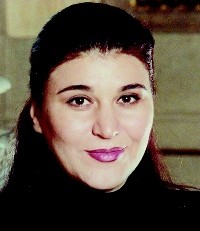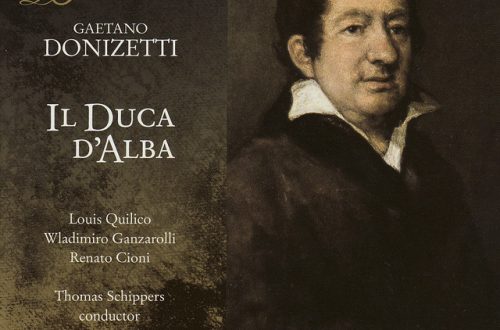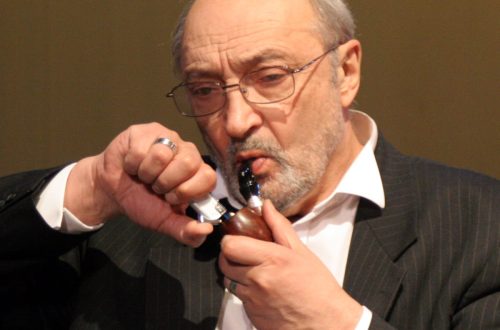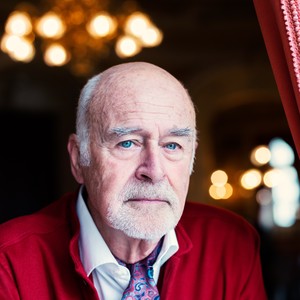
Iano Tamar |
Iano Tamar

Her Medea cannot be called a copy of the great reading of Maria Callas – Yano Tamar’s voice does not resemble the unforgettable sound of her legendary predecessor. And yet, her jet-black hair and thickly made-up eyelids, no, no, yes, and they refer us to the image created half a century ago by a brilliant Greek woman. There is something in common in their biographies. Just like Maria, Yano had a strict and ambitious mother who wanted her daughter to become a famous singer. But unlike Callas, the native of Georgia never held a grudge against her for these proud plans. On the contrary, Yano more than once regretted that her mother died too early and did not find the beginning of her brilliant career. Like Maria, Yano had to seek recognition abroad, while her homeland was plunged into the abyss of civil war. For some, the comparison with Callas can sometimes seem far-fetched and even sound unpleasant, something like a cheap publicity stunt. Starting with Elena Souliotis, there has not been a year that an overly exalted public or not too scrupulous criticism did not proclaim the birth of another “new Callas”. Of course, most of these “heirs” could not stand comparison with a great name and very quickly descended from the stage into oblivion. But the mention of a Greek singer next to the name Tamar seems, at least today, completely justified – among the many current wonderful sopranos decorating the stages of various theaters of the world, you will hardly find another one whose interpretation of the roles is so deep and original, so imbued with the spirit of the music performed .
Yano Alibegashvili (Tamar is her husband’s surname) was born in Georgia*, which in those years was the southern outskirts of the boundless Soviet empire. She studied music since childhood, and received her professional education at the Tbilisi Conservatory, graduating in piano, musicology and vocals. The young Georgian woman went to improve her singing skills in Italy, at the Osimo Academy of Music, which in itself is not surprising, since in the countries of the former Eastern bloc there is still a strong opinion that real vocal teachers live in the homeland of bel canto. Apparently, this conviction is not without foundation, since her European debut at the Rossini festival in Pesaro in 1992 as Semiramide turned into a sensation in the world of opera, after which Tamar became a welcome guest at the leading opera houses in Europe.
What surprised the demanding audience and captious critics in the performance of the young Georgian singer? Europe has long known that Georgia is rich in excellent voices, although singers from this country, until recently, did not appear on European stages so often. La Scala remembers the wonderful voice of Zurab Anjaparidze, whose Herman in The Queen of Spades made an indelible impression on Italians back in 1964. Later, the original interpretation of the Othello party by Zurab Sotkilava caused a lot of controversy among critics, but it hardly left anyone indifferent. In the 80s, Makvala Kasrashvili successfully performed Mozart’s repertoire at Covent Garden, successfully combining it with roles in operas by Verdi and Puccini, in which she was repeatedly heard both in Italy and on German stages. Paata Burchuladze is the most familiar name today, whose granite bass has more than once aroused the admiration of European music lovers. However, the impact of these singers on the audience stemmed rather from a successful combination of the Caucasian temperament with the Soviet vocal school, more suitable for parts in late Verdi and verist operas, as well as for the heavy parts of the Russian repertoire (which is also quite natural, since before the collapse of the Soviet empire, the golden voices of Georgia sought recognition primarily in Moscow and St. Petersburg).
Yano Tamar decisively destroyed this stereotype with her very first performance, demonstrating a real school of bel canto, perfectly suited to the operas of Bellini, Rossini and early Verdi. The very next year she made her debut at La Scala, singing on this stage Alice in Falstaff and Lina in Verdi’s Stiffelio and meeting two geniuses of our time in the person of conductors Riccardo Muti and Gianandrea Gavazeni. Then there was a series of Mozart premieres – Elektra in Idomeneo in Geneva and Madrid, Vitellia from the Mercy of Titus in Paris, Munich and Bonn, Donna Anna in the Venetian theater La Fenice, Fiordiligi in Palm Beach. Among the single parts of her Russian repertoire** there remains Antonida in Glinka’s A Life for the Tsar, performed in 1996 at the Bregenz Festival conducted by Vladimir Fedoseev and also fitting into the “belkant” mainstream of her creative path: as you know, of all Russian music, it is Glinka’s operas are closest to the traditions of the geniuses of “beautiful singing”.
1997 brought her debut on the famous stage of the Vienna Opera as Lina, where Yano’s partner was Placido Domingo, as well as a meeting with the iconic Verdi heroine – the bloodthirsty Lady Macbeth, which Tamar managed to embody in a very original way. Stefan Schmöhe, having heard Tamar in this part in Cologne, wrote: “The voice of the young Georgian Yano Tamar is relatively small, but impeccably smooth and controlled by the singer in all registers. And it is precisely such a voice that is the best suited to the image created by the singer, who shows her bloody heroine not as a ruthless and perfectly functioning killing machine, but as a super-ambitious woman who seeks in every possible way to use the chance provided by fate. In subsequent years, the series of Verdi images was continued by Leonora from Il trovatore at the festival that became her home in Puglia, Desdemona, sung in Basel, the Marquise from the rarely sounding King for an Hour, with which she made her debut on the stage of Covent Garden, Elisabeth of Valois in Cologne and, of course, Amelia in the Masquerade Ball in Vienna (where her compatriot Lado Ataneli, also a debutant Staatsoper, acted as Yano’s partner in the role of Renato), about which Birgit Popp wrote: “Jano Tamar sings the scene on the gallows mountain every evening more and more heartfelt, so her duet with Neil Shicoff gives music lovers the highest pleasure.
Deepening her specialization in romantic opera and adding to the list of sorceresses played, in 1999 Tamar sang Haydn’s Armida at the Schwetzingen Festival, and in 2001 in Tel Aviv, for the first time, she turned to the pinnacle of bel canto opera, Bellini’s Norma. “Norm is still just a sketch,” says the singer. “But I am happy that I had the opportunity to touch this masterpiece.” Yano Tamar tries to reject proposals that do not correspond to her vocal abilities, and so far only once yielded to the impresario’s insistent persuasion, performing in a verist opera. In 1996, she sang the title role in Mascagni’s Iris at the Rome Opera under the baton of maestro G. Gelmetti, but she tries not to repeat such an experience, which speaks of professional maturity and the ability to reasonably select a repertoire. The discography of the young singer is not yet great, but she has already recorded her best parts – Semiramide, Lady Macbeth, Leonora, Medea. The same list includes the part of Ottavia in G. Pacini’s rare opera The Last Day of Pompeii.
The performance on the stage of the Deutsche Oper in Berlin in 2002 is not the first time Yano Tamar has met the title role in Luigi Cherubini’s three-act musical drama. In 1995, she already sang Medea – one of the bloodiest parts in terms of both dramatic content and vocal complexity of the parts of the world opera repertoire – at the Martina Francia festival in Puglia. However, for the first time she appeared on the stage in the original French version of this opera with colloquial dialogues, which the singer considers much more complex than the well-known Italian version with later accompanying recitatives added by the author.
After her brilliant debut in 1992, over the decade of her career, Tamar has grown into a real prima donna. Yano would not like to be compared often – by the public or journalists – with her famous colleagues. Moreover, the singer has the courage and ambition to interpret the chosen parts in her own way, to have her own, original performing style. These ambitions also harmonize well with the feminist interpretation of Medea’s part, which she proposed on the stage of the Deutsche Oper. Tamar shows the jealous sorceress and, in general, the cruel killer of her own children, not as a beast, but as a deeply offended, desperate and proud woman. Yano states, “Only her unhappiness and vulnerability awaken in her the desire for revenge.” Such a compassionate view of the child killer, according to Tamar, is embedded in a completely modern libretto. Tamar points to the equality of man and woman, the idea of which is contained in the drama of Euripides, and which leads the heroine, who belongs to a traditional, archaic, in the words of Karl Popper, “closed” society, to such a hopeless situation. Such an interpretation finds a special sound precisely in this production by Karl-Ernst and Urzel Herrmann, when the directors try to highlight in conversational dialogues the brief moments of intimacy that existed in the past between Medea and Jason: and even in them Medea appears as a woman who knows no one fear.
Critics praised the last work of the singer in Berlin. Eleonore Büning of the Frankfurter Allgemeine notes: “Soprano Jano Tamar overcomes all national barriers with her heart touching and truly beautiful singing, making us remember the art of the great Callas. She endows her Medea not only with a firm and highly dramatic voice, but also gives the role different colors – beauty, despair, melancholy, fury – all that makes the sorceress a truly tragic figure. Klaus Geitel called the reading of Medea’s part very modern. “Mrs. Tamar, even in such a party, focuses on beauty and harmony. Her Medea is feminine, has nothing to do with the terrible child-killer from ancient Greek myth. She tries to make the actions of her heroine understandable to the viewer. She finds colors for depression and remorse, not only for revenge. She sings very tenderly, with great warmth and feeling.” In turn, Peter Wolf writes: “Tamar is able to subtly convey the torment of Medea, a sorceress and rejected wife, trying to restrain her vengeful impulses against a man whom she made powerful with her magic by deceiving her father and killing her brother, helping Jason achieve what he wanted. An anti-heroine even more repulsive than Lady Macbeth? Yes, and no at the same time. Dressed mostly in red, as if bathed in bloody streams, Tamar endows the listener with singing that dominates, takes possession of you, because it is beautiful. The voice, even in all registers, reaches great tension in the scene of the murder of little boys, and even then arouses a certain sympathy in the audience. In a word, there is a real star on stage, who has all the makings of becoming the ideal Leonora in Fidelio in the future, and perhaps even a Wagnerian heroine. As for the Berlin music lovers, they are looking forward to the return of the Georgian singer in 2003 to the stage of the Deutsche Oper, where she will again appear before the public in Cherubini’s opera.
The fusion of the image with the personality of the singer, at least until the moment of infanticide, looks unusually plausible. In general, Yano feels somewhat uncomfortable if she is called a prima donna. “Today, unfortunately, there are no real prima donnas,” she concludes. She is increasingly seized by the feeling that the true love of art is gradually being lost. “With few exceptions, such as Cecilia Bartoli, hardly anyone else sings with heart and soul,” says the singer. Yano finds Bartoli’s singing truly grandiose, perhaps the only example worthy of emulation.
Medea, Norma, Donna Anna, Semiramide, Lady Macbeth, Elvira (“Ernani”), Amelia (“Un ballo in maschera”) – in fact, the singer has already sung many large parts of a strong soprano repertoire, which she could only dream of when she left her home to continue their studies in Italy. Today, Tamar tries to discover new sides in familiar parts with each new production. This approach makes her related to the great Callas, who, for example, was the only one who performed in the most difficult role of Norma about forty times, constantly bringing new nuances to the created image. Yano believes that she was lucky on her creative path, because always in times of doubt and painful creative search, she met the necessary people, such as Sergio Segalini (artistic director of the Martina Francia festival – ed.), who entrusted a young singer performing the most complicated part of Medea at a festival in Puglia and was not mistaken in it; or Alberto Zedda, who chose Rossini’s Semiramide for her debut in Italy; and, of course, Riccardo Muti, with whom Yano had the good fortune to work at La Scala on the part of Alice and who advised her not to rush to expand the repertoire, saying that time is the best assistant for the singer’s professional growth. Yano sensitively listened to this advice, regarding it as a great privilege to harmoniously combine career and personal life. For herself, she decided once and for all: no matter how great her love for music, her family comes first, and then her profession.
In preparing the article, materials from the German press were used.
A. Matusevich, operanews.ru
Information from the Big Opera Dictionary of Kutsch-Riemens Singers:
* Yano Tamar was born on October 15, 1963 in Kazbegi. She began performing on stage in 1989 at the Opera House of the Georgian capital.
** When she was a soloist of the Tbilisi Opera House, Tamar performed a number of parts of the Russian repertoire (Zemfira, Natasha Rostova).





